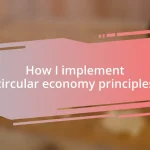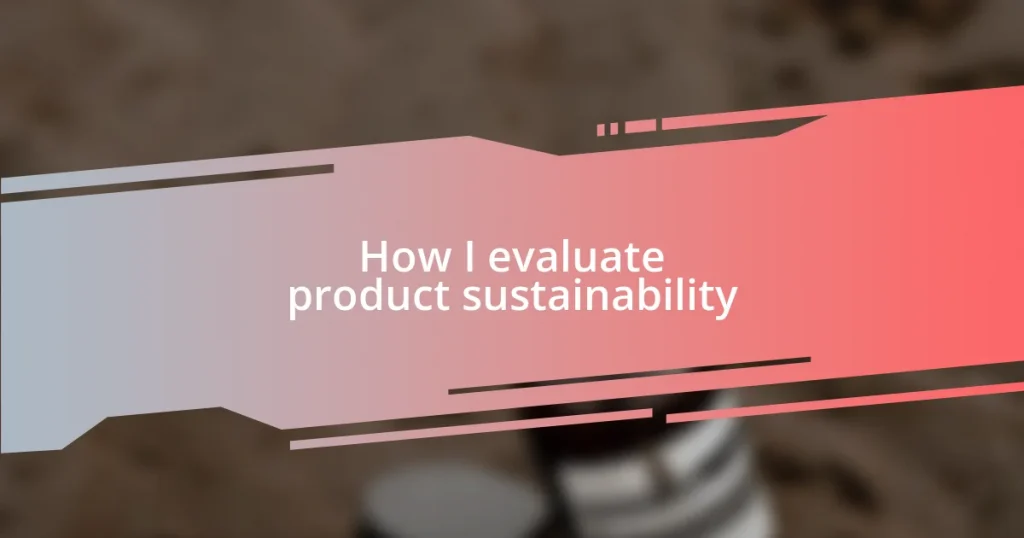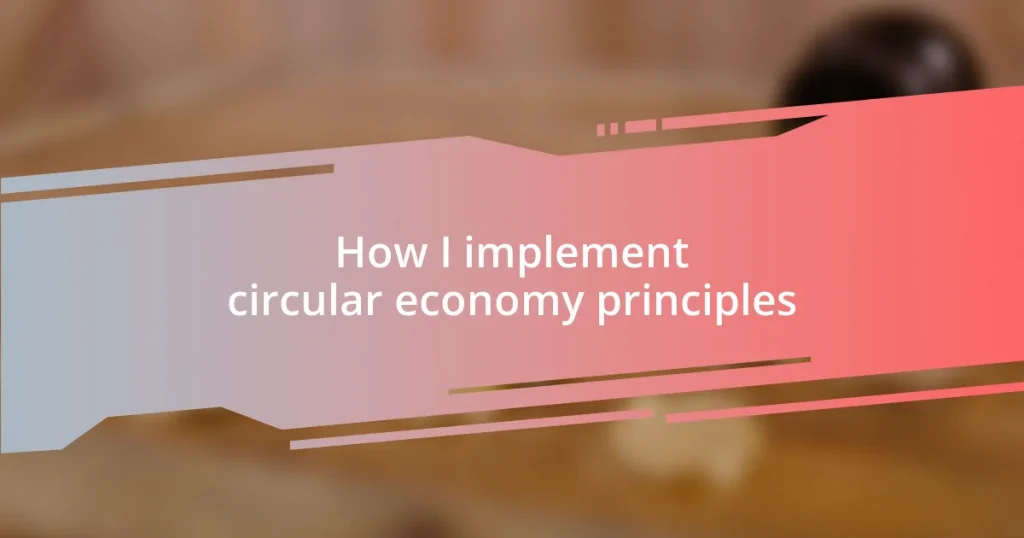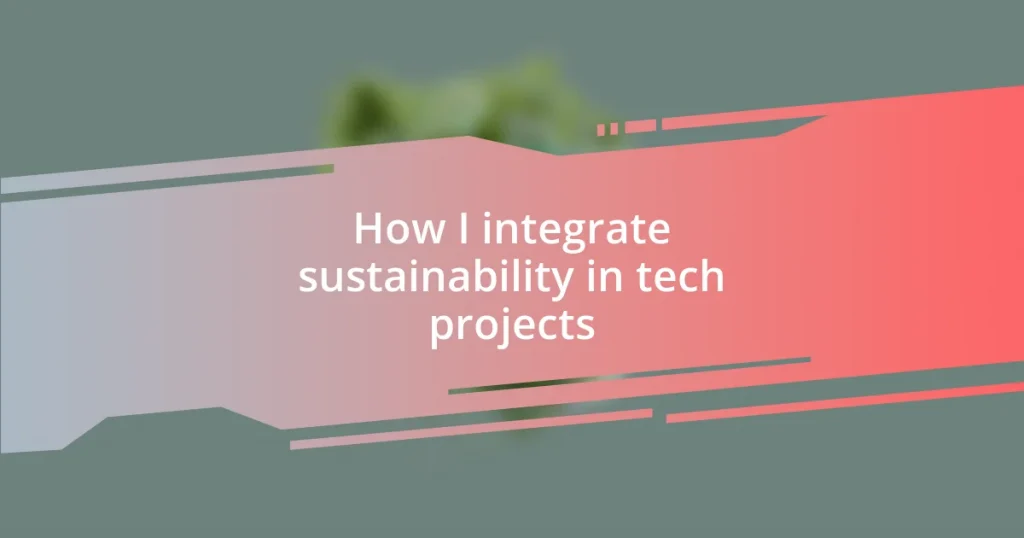Key takeaways:
- The journey into quantum computing began with a transformative experience at a tech conference, igniting a passion for understanding complex concepts like qubits, superposition, and entanglement.
- Networking played a crucial role in discovering opportunities, as engaging with communities, professionals, and mentors opened doors to internships and collaborative projects.
- Career exploration revealed a diverse range of roles in quantum computing, emphasizing the need for interdisciplinary skills, adaptability, and a passion for innovation in a rapidly evolving field.

How I discovered quantum computing
My journey into quantum computing began unexpectedly during a tech conference I attended a few years ago. I remember sitting in awe as a speaker described the potential of quantum bits, or qubits, and how they could revolutionize computing. Isn’t it fascinating to think how something so abstract could hold the key to solving problems that classical computers can’t tackle effectively?
As I delved deeper into the subject, I found myself captivated by the strange world of superposition and entanglement. I distinctly recall the moment when I understood that a qubit could exist in multiple states simultaneously. It felt like a light bulb went on, illuminating a realm where the rules of reality seemed to bend. Have you ever had a moment when knowledge transformed your perspective? For me, it was the awakening that there was so much more to computing than I had ever imagined.
I began exploring online resources, joining forums, and even taking introductory courses to quench my insatiable curiosity. One night, while working through a coding project that aimed to simulate quantum algorithms, I felt a rush of excitement mixed with the challenge of tackling a subject that seemed daunting yet exhilarating. Each discovery was a new piece of a complex puzzle, and I couldn’t help but wonder how this knowledge could shape the future. It’s this feeling of exploration that makes me passionate about quantum computing to this day.

Understanding quantum computing basics
When I first tried to grasp the concept of quantum computing, it felt like stepping into a different universe. Unlike classical computers that use bits as the smallest units of data, quantum computers employ qubits, which can represent 0, 1, or both at the same time due to a principle called superposition. This idea initially bewildered me, but then I realized this unique capability allows quantum computers to perform many calculations simultaneously, offering an enormous potential for solving complex problems.
As my understanding deepened, I couldn’t help but be intrigued by another quantum principle: entanglement. This phenomenon connects qubits in such a way that the state of one qubit can depend on the state of another, no matter the distance between them. One late night, while attempting to understand this concept through simulations, I felt a mixture of excitement and confusion wash over me. How could two particles remain connected across vast distances? It felt almost magical, yet it was grounded in the laws of physics. This blend of mystery and reality only fueled my desire to further explore quantum mechanics.
The more I explored, the clearer it became how these core principles differ from traditional computing. Quantum computing opens doors to fields ranging from cryptography to drug discovery at speeds previously thought impossible. I often found myself pondering not just the technology, but the ethical implications and the transformative impact it could have on society. For instance, how will industries adapt to leverage quantum advancements? I became captivated by the possibilities, shaping my perception of not just computing but our future landscape.
| Aspect | Classical Computing | Quantum Computing |
|---|---|---|
| Data Unit | Bit | Qubit |
| State Representation | 0 or 1 | 0, 1, or both (Superposition) |
| Connection | Independent Bits | Entangled Qubits |
| Performance | Linear Processing | Parallel Processing |

Assessing skills for quantum computing
Before diving into the world of quantum computing, I realized it was essential to assess my existing skill set. Understanding quantum mechanics requires a foundation in linear algebra and probability theory, which can feel intimidating at first. I remember thumbing through my old math textbooks, feeling a mix of nostalgia and a hint of anxiety about digging deep into concepts I hadn’t visited in years. I quickly recognized that a systematic evaluation of my skills would help me identify gaps and guide my learning journey effectively.
When it comes to assessing skills for quantum computing, here are some key areas to consider:
- Mathematical Proficiency: Ensure a solid grasp of linear algebra, calculus, and probability.
- Programming Skills: Familiarity with languages like Python is invaluable for coding quantum algorithms.
- Logical Reasoning: Use logical thinking as a tool to break down complex problems.
- Understanding of Quantum Mechanics: Basic knowledge of quantum physics principles is crucial.
- Problem-Solving Aptitude: Embrace challenges and cultivate a mindset geared toward developing innovative solutions.
As I engaged in self-assessment, I often felt a mix of excitement and unease. Honestly, the uncertainty about whether I’d measure up to the challenges ahead pushed me to seek out communities online and engage in discussions. That support network became a lifeline, guiding me through areas I wasn’t familiar with. Each interaction fostered a sense of belonging, turning my apprehension into enthusiasm as I mapped out the trajectory of my journey into quantum computing.

Resources for learning quantum computing
The journey of learning quantum computing can feel overwhelming without the right resources. I found immense value in online platforms like Coursera and edX, which offer courses from top universities, breaking complex topics down into manageable lessons. I remember starting my first course and thinking, “Will I really understand this?” But as I progressed, I was pleasantly surprised by how well these structured lessons clarified my understanding of entanglement.
Books also became an essential part of my learning arsenal. “Quantum Computation and Quantum Information” by Nielsen and Chuang stood out for me; it was like having a conversation with the authors themselves, guiding me through intricate concepts. I often highlighted passages and scribbled notes in the margins, my thoughts bubbling up as I deciphered the principles alongside practical examples. There were moments when I’d put the book down, overwhelmed yet invigorated, pondering how this knowledge could radically reshape technology.
Additionally, engaging with online communities, like the Quantum Computing Stack Exchange, opened up new dimensions in my understanding. I recall posting a question about quantum gates and receiving immediate, insightful responses from enthusiasts and experts alike. This collaborative environment not only boosted my confidence but also reminded me of the importance of learning from others. Have you ever felt that spark when a new concept suddenly clicks? I cherish those moments; they reminded me why I embarked on this quantum adventure in the first place.

Networking in the quantum community
Networking within the quantum community is one of the most rewarding paths I’ve taken on this journey. I still remember the first time I attended a quantum computing meetup; the excitement in the room was palpable. I felt like I had found my tribe—people who shared my curiosity and passion for exploring the possibilities of quantum technology. Each conversation opened my eyes to new ideas and perspectives, and I often left those events buzzing with inspirations and potential collaborations. Have you ever had a moment when you felt completely at home among strangers? That’s precisely how I felt.
Engaging with industry professionals on platforms like LinkedIn has been another effective strategy for building my network. I reached out to experts whose work I admired, and to my surprise, many responded positively. It’s humbling to engage in dialogue with seasoned individuals, learning from their experiences. I recall one particular exchange with a researcher who shared insights about their latest project. Not only did it deepen my understanding, but it also revealed the importance of being open to conversations, even if they initially feel intimidating. Networking is not just about creating connections; it’s about cultivating genuine relationships based on shared interests.
Finally, online forums have become a goldmine for networking opportunities. I’ve participated in discussions on platforms like Reddit and specialized Discord servers, which have introduced me to budding quantum enthusiasts and experts alike. The sense of community and support in these spaces has been incredible. One time, after sharing my experiences with quantum algorithms, someone reached out to collaborate on a project idea we could both explore. It’s moments like these that drive home the value of networking—every conversation can lead to unexpected opportunities. So, as you venture into the quantum realm, don’t underestimate the power of reaching out; you might just find your next big idea waiting around the corner.

Finding internships in quantum computing
Finding internships in quantum computing can be quite an adventure, and my personal experience taught me a lot about the process. Early on, I scoured university websites and industry job boards, stumbling upon listings that made my heart race. One internship, in particular, called to me; it was a position focusing on quantum algorithms, which aligned perfectly with my newfound passion. Have you ever felt that rush when you find something that could ignite your future?
I quickly learned the importance of tailored applications. I remember pouring hours into my resume, making sure to highlight not just my technical skills but my enthusiasm for quantum computing as well. In one instance, I had a conversation with a recruiter who emphasized the significance of passion in this field—plainly stating that they would choose an applicant with genuine interest over a more qualified candidate lacking that spark. This insight shaped how I portrayed myself throughout the application process.
Ultimately, leveraging connections from my networking efforts was invaluable. One of my mentors mentioned a startup working on quantum encryption. I never would have heard about that opportunity if I hadn’t reached out to someone in my network. It transformed my approach; it was a reminder that internships often come from the most unexpected places. Have you thought about how vital personal connections can be on your path to landing an internship? They truly can open doors you didn’t even know existed.

Exploring careers in quantum computing
The world of quantum computing is teeming with career possibilities that can be both exhilarating and daunting. I recall my excitement when I first encountered the range of positions, from quantum software developers to theoretical physicists. Have you considered how your unique skills might fit into such a multifaceted field? For me, it was a thrilling realization that my background in programming could intersect with quantum mechanics, leading to a career where I could contribute to groundbreaking advancements.
As I continued to explore, I stumbled upon roles that blend different disciplines—like quantum hardware engineering, where knowledge of both quantum physics and engineering principles is essential. This blend made me think about the importance of interdisciplinary skills in today’s job market. Have you ever felt that urge to learn something outside your comfort zone? That’s the spirit I took on, diving into workshops and courses to broaden my expertise in areas I hadn’t previously considered.
Another insightful moment occurred during a panel discussion with industry leaders, where I learned about the importance of adaptability in this evolving field. One expert spoke candidly about how many initial projects failed but led to unexpected breakthroughs. It struck me that a career in quantum computing is not just about technical prowess, but also about resilience and a willingness to embrace change. Have you reflected on how you handle setbacks? Those very experiences can converge to shape your path in ways you might not envisage at first.















